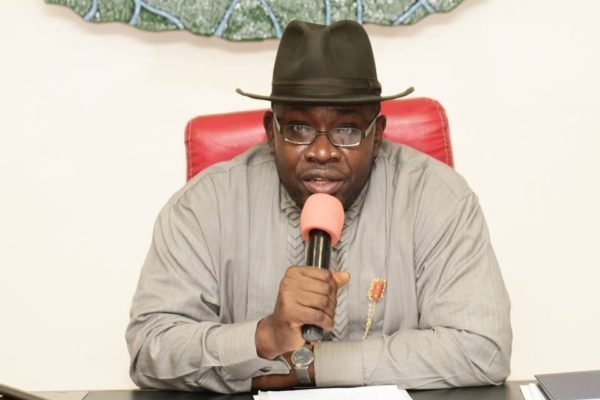Latest News
Governor Dickson declines assent to bill seeking life pension for Bayelsa lawmakers, give reasons

The Bayelsa State Governor, Seriake Dickson, has declined assent to the bill seeking lifetime pension for lawmakers in the state as proposed and passed by the Assembly.
Mr. Daniel Iworiso-Markson, the State Commissioner for Information, in a statement said the governor conveyed the decision to decline assent to the bill in a letter to the Speaker of the Bayelsa State House of Assembly on Monday.
The Governor held consultations with the Assembly members in his country home of Toru-Orua, where he explained his reason for declining assent.
He said the bill was inconsistent with Section 124 of the Constitution of the Federal Republic of Nigeria as amended.
Governor Dickson said that he was of the view that the State Assembly lacked the powers to expand the categories of public servants who should be entitled to a pension.
He said that he had to withhold assent to the bill because the State which was bedeviled with a lot of challenges in spite of its low Internally generated revenue base and unstable earnings from the oil economy was the only state out of Nigeria’s 36 states to come up with such a bill.
According to him, he was guided in the decision by the principle that government should not be for a select class of the privileged in the society, and would not discard it over seven years into his administration.
“The lawmakers and indeed the Nigerian populace would attest to the fact that all decisions of his administration were guided by the strong urge to protect the public interest and promote the general good”.
He said that the quest to protect the vulnerable against the privileged few inspired the populist programmes of his administration which include the Bayelsa Health Insurance Scheme with over 150, 000 beneficiaries, the Education Trust Fund, the scholarship programmes that are supporting our young people in their studies both locally and outside the country, the various empowerment programmes, support for the aged, the most vulnerable, massive employment, public housing and a number of other social intervention programmes which are already taking root.
He commended the leadership of the house for the healthy relationship with the executive organ and the high level of productivity as shown by the high number of bills and motions passed during the period insisting that their place in history was guaranteed.
He said that notwithstanding his decision to decline assent to the bill, he still holds the Assembly in very high esteem.
The Governor also noted that he had to set up a committee on the contributory pension scheme to make it workable so that the assembly members and other appointees at the state and local government levels who are interested can take advantage of it.
The Governor urged the Assembly members to liaise with the committee adding that if legislative action was required after the work of the committee, he would readily communicate with them.
























